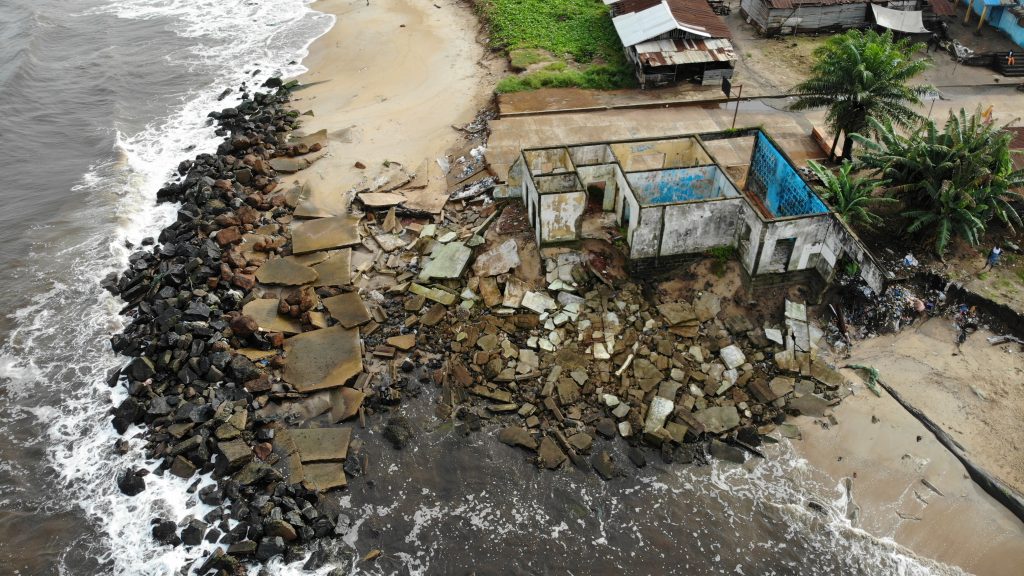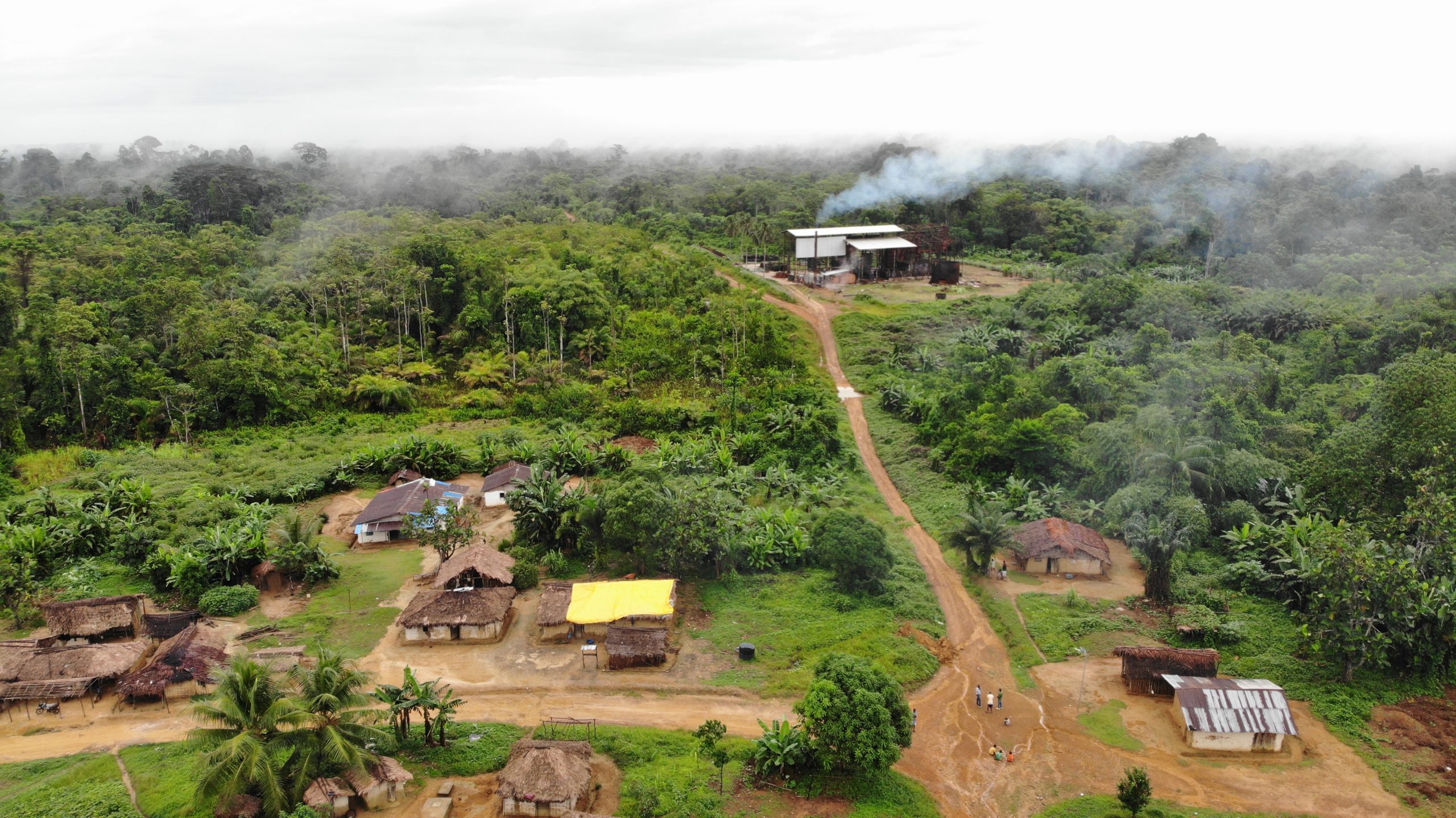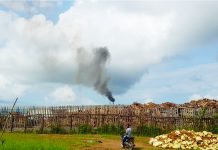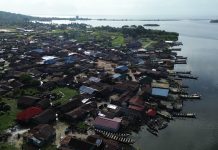Top: An oil palm mill in a town in Sanquin District, Sinoe County. The DayLight/Derick Snyder
By Gabriel Carter
We cannot deny the level of carbon dioxide (CO2) gas that has been and continues to be emitted into the air by various methods since the beginning of the First Industrial Revolution. With the advancement in technologies from automobiles, planes, ships, industrial factories, various electrical grids, and other power plants, the earth has absorbed the effect of the byproducts of these advancements. Somehow, the damaging impact of CO2 emission also known as greenhouse gas (GHG) hasn’t been a focal point of any of the global economic forums until its impact began to show signs of existential threat to us as a species.
We have ignored scientists from various disciplines highlighting the initial threats of global warming. But gradually, as more evidence emerged supported by scientific data coupled with the changes in our weather pattern as evidenced by frequent natural disasters such as wildfires, hurricanes, tornados, droughts, floods and even tsunamis, and in the tropical climate, heavy torrential rain with flood, we have felt the economic impact of climate change. The frequency of these threats and the severe financial impact resulting in billions of dollars in losses have garnered the need for a global effort and collective agreement to fight the rise in temperatures.
Africa, as a continent, contributes less GHG to the planet compared to other regions of the world. This is in part due to the lack of scale in industrialization on the continent (link to previous article on industrialization) which would have increased its level of pollution. More countries on the continent are relatively young compared to the rest of the world. It is also important to note that Africa’s contribution to global greenhouse gas emissions varies among countries. It is influenced by factors such as population size, economic development, energy sources and land-use practices.
Key points regarding Africa’s contribution to climate change:
- Greenhouse Gas Emission – Africa’s total greenhouse gas emissions account for a relatively small portion of the global emissions, approximately 4% as of 2022. This is significantly lower than emissions from other regions such as Asia, North America, and Europe.
- Energy Sources – the energy sector is one of the primary sources of greenhouse gas emissions globally. In Africa, many countries rely on fossil fuels for energy generation, including coal, oil and natural gas. However, the overall energy consumption and emissions from the energy sector in Africa are comparatively lower in others than in other regions due to limited access to modern energy infrastructure and services in some areas.
- Land-use change and Agriculture: Land-use change, such as deforestation and land degradation, contributes to CO2 emissions. In Africa, deforestation occurs due to factors like agriculture expansion, logging, and infrastructure development. Additionally, agriculture practices such as livestock production and rice cultivation can generate emissions of methane and nitrous oxide.
- Industrial Activities – Africa’s industrial sector which is currently growing, is not as extensive as in other regions. However, certain industries, such as mining and cement production, can contribute to greenhouse gas emissions.
- Adaptation Challenges – Africa is vulnerable to the impacts of climate change, especially from droughts, floods, and changing rainfall patterns.
- African countries face challenges in adapting to climate change due to limited financial resources and infrastructure, making it crucial to prioritize climate resilience and adaptation measures
As they began to scale up industrialization with the adoption of technologies, their emission of greenhouse gas (GHG) will increase and subsequently their collective pollution levels. This presents an opportunity for countries on the continent to adapt to cleaner energy sources, and more electric vehicles, build industrial factories that leverage cleaner energy sources and move toward a better and cleaner and more sustainable climate than their other counterparts.
It is important to highlight that within Africa, there is considerable variation in greenhouse gas emissions among countries. Some countries have higher emissions due to factors such as larger populations, industrialization, or resource extraction, while others have significantly lower emissions. It is crucial for Africa, like other regions, to continue working towards sustainable development, low-carbon pathways, and promoting renewable energy sources to mitigate climate change and reduce emissions.
The fight to coalesce both the global south and global north is already being met with inequity. The developing countries, particularly those in the global south have a justified reason for wanting the establishment of Loss and Damage financing. Why? These countries contribute a fraction of the global CO2 emission, yet they face the same level of climate impact as the rest of the world. To justify the fight to net zero, the funding facility will help them deal with some of the impacts caused by climate change.
Why more funding should be allocated to African countries.

Despite these sources of funding and the call to unify countries to coalesce around the fight to reduce global temperatures, there are still questions, unresolved concerns, and a shortfall in funding to ensure the fight to net zero is achieved. Some major emitters such as China, Russia and India aren’t on board the global fight to reduce net CO2. They have opted out of the latest conference because these countries are in the middle of an innovative revolution where the developed countries were 50-60 years ago. They are not going to allow themselves to ease off the pace of development because of the impact of climate change.
If developing countries such as China, Russia and India are opting out of the COP Conferences because it could slow the pace of their development, why aren’t African countries that I believe are yet to have developed beyond the Second Industrial Revolution opting out? The amount of funding being committed from the developed countries towards African countries’ Loss and Damages isn’t worth sacrificing their move towards industrialization. Even if the developed countries make the case that a shift toward greener innovation, including cleaner cement, industrial manufacturing plants and facilities, transport, and infrastructures; there are major funding deployments that are required to shift to green innovation. Who is going to fund the gap in funding if African countries do embark on the move toward green innovation if the developed countries can’t even agree to establish a Loss and Damage Financing facility?
African countries currently depend on these MDBs to fund the majority of the major infrastructure projects. Some of them even depend on these MDBs for budgetary support and these loans from these multilateral development banks have been crushing these countries because of how they are structured. Yet, do we want the same MDBs to now lead the financing of climate change in African countries?
Industrialization and innovation and the move towards middle-income states or developed countries should be the priority for all African countries. If those innovations and industrialization to improve productivity come at the cost of becoming major emitters similar to their Western counterpart, then let’s all bear the responsibility of the cost of industrializing and moving to middle-income states or developed nations. If not, then the major emitters who have enjoyed and continue to enjoy the benefit of emitting the quantum amount of CO2 in the air should agree to the proposal of the developing countries to not only fund the Loss and Damage but also establish a Global South Climate Fund to help those countries move toward greener innovations and industrialization without sacrificing their move to middle-income states and developed nations. This is the more equitable way to approach climate change if we expect every nation, be it those in the frontier market, emerging market and developed markets to coalesce around the move towards net zero.
Gabriel Carter is a banking and financial expert with over a decade of experience in commercial banking, credit risk, and investment banking. Currently, he is a Vice-President and Portfolio Manager at one of the nation’s leading financial institutions managing over $1.8 billion in assets. He sits on the firm’s commercial real estate climate change team as a subject matter expert.
Gabriel holds a BSc. in Finance from Cambridge College and a Master of Science in Finance from Brandeis University – International Business School.





Facebook Comments